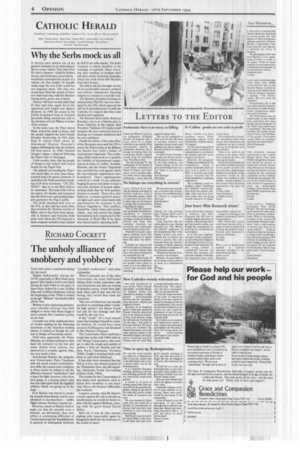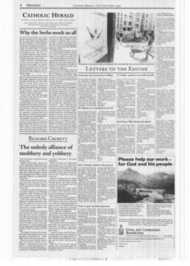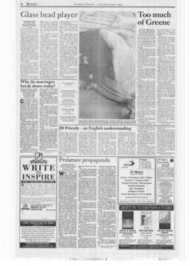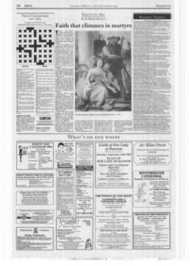Page 4, 16th September 1994
Page 4

Report an error
Noticed an error on this page?If you've noticed an error in this article please click here to report it.
Tags
Share
Related articles
Pope May Visit Zagre
A Town Called Peace
Peacemakers Centrestage
= , John Paul 11 Warns Thousands Could Die In Bosnia If...
Puljic Anger At Un
Why the Serbs mock us all
IT WOULD HAVE PROVED one of the greatest triumphs in an extraordinary life as a peace maker. Pope John Paul II's visit to Sarajevo foiled by Serbian threats and Orthodox intractability would have reminded the people of a captive city that despite 29 months under siege the rest of the world has not forgotten them. The visit, too, would have filled the people of Sarajevo with hope that, with the liberator among them, peace was at hand.
History will bear out that John Paul II time and time again freed the oppressed and waged war against dictators. In 1983 his return to his Polish homeland lead to General Jaruzelski lifting martial law, and to the elevation of Lech Walesa to leader of his country.
In the same year, the Pope visited Haiti, sowed his seeds of peace, and the people toppled the Jean-Claude Duvalier dictatorship. In 1987, John Paul II visited Chile where he denounced General Pinochet's regime; following his visit, the General fell from power. In 1988, General Ortega's regime collapsed following the Pope's visit to Nicaragua.
Little wonder, then, that the people of Sarajevo had waited with bated breath for the Papal Visit.
The debacle surrounding the Pope's visit sheds light on more than disappointed hopes for peace, however. It underlines the Serbs persistent mocking of all those acronyms UN, EU, NATO that we in the West hold to be sacrosanct. The head of the UN in the region, Dr Akashi, had requested that the Serb truce surrounding Sarajevo guarantee the Pope's safety.
The Serbs thumbed their nose at the UN, as they did last week when they attacked the Muslem enclave of Bihac, and as they have done repeatedly in Sarajevo and Gorazde, both areas were where the UN imposed a heavy weapons exclusion zone, backed by NATO air strike threats. The Serbs continue to attack, headless of the warnings of reprisals. More worrying, they continue to instigate their merciless ethnic cleansing campaign, which last week drove 600 Muslims from their homes.
The failed visit also brought out the all too predictable scenario: political and military commandos hijacking religion as a means to a horrific end.
The Bosnian president Izetbegovic claimed John Paul II's visit was sabotaged-by the UN, which opposed the visit for its potential power to unify the Catholics in a region that they want divided and separated.
The Bosnian Scrb leader, Radovan Karadzic, saw it as a Vatican ploy to boost Catholics in the region. And President Tudjman of Croatia could interpret the now restricted visit as a blessing on Croatian statehood and his own ambitions.
Finally the failure of the joint effort of the European union and the UN to ensure the Pope's safety in the Balkans has thrown into relief a failure of much greater magnitude. The continuing conflict must prod us to question the viability of international organisations in areas of conflict. Somalia, Rwanda, and the former Yugoslavia have provided the rock against which the international organisations have foundered. These organisations evolved as a result of our collective longing for peace and desire to have a universal standard of human rights. sterling ideals that the Serb gunmen threaten to tarnish. Those of us who believe in a common good of universal rights and peace must watch with apprehension the situation in the former Yugoslavia. This conflict, dictated by ethnic claims and counter claims, may well unravel the fragile international web constructed in the aftermath of World War II by those who feared history repeating itself.
blog comments powered by Disqus












